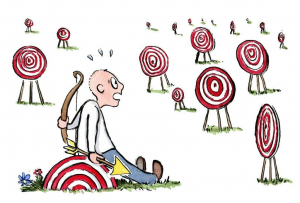Some polyglots have mastered up to 12 languages. How is it even possible to find space for such an unimaginably huge number of words? Obviously, that would not be possible if they used the same method of studying as school pupils: quickly learn vocabulary lists before a test and have an empty mind after passing it. This tactic is suitable only for short-term results and is useless in a long-term perspective. All the effort put will be in vain – you would be lucky to remember 20-30 percent of the material if not less. Here is a list of useful habits for language learners to instill.
Use Every Opportunity to Practice
Naturally, every person spends a lot of time in queues. A person with a powerful desire for self-improvement will use up that “dead time”. Load your phone with podcasts, audiobooks, e-books, articles and you will never murder yourself with a question on how to entertain yourself in a mind-numbing queue. Incorporate the language you are learning into your lifestyle.

Set Realistic Goals
Going ahead without a clear understanding of why you are even doing this is pointless. How would your current situation improve if you had a high level of a foreign language? How will it influence your life? Stop and determine why is it important to you, why you need to stay disciplined. There is a saying in English: “If there is no WHY there is no WAY”. Therefore, if you ever feel discouraged, take a look at your list of WHYs and stay motivated.
Mistakes are an inseparable part of language learning. To clean your language, you must not avoid failures, but face them, analyze, correct and never repeat again.

Think In Another Language
Everyone has their own incessant flow of thoughts, inner monologue. Try to lead it in another language. Describe your environment, food, actions, other people’s appearance. Start a blog or diary – this will bring positive results, advance your ability to compile sentences, structure and express your thoughts. Unknown words? Translate, write down, add to your personal dictionary and review regularly.
Be the way, another common mistake is looking up unnecessary words in the dictionary while reading a book. To paraphrase, one can write out synonyms to the world “said”, which have emotional coloring: avowed, crowed, gushed, chortled, snickered, bawled, fretted, gasped, wept, wailed, gripped, growled, jeered, sassed, scolded, blurted, grunted and others. Look up only those words that influence the context and your general understanding of the message. Otherwise, you will lose your interest in no time.
But let’s back to blogging as a habit to learn a new language. This method is particularly efficient for intermediate and upper-intermediate learners, who need to gain more confidence and fluency in speaking. It is not worth swinging at advanced texts when you are a pre-intermediate learner. To progress, it is essential to master one level and then move on to another.
Many people may not seat well with this advice, but, it enriches your vocabulary with routine words. Besides, you can even kill two birds with one stone: recall a paragraph in history, geography or any other subject, retell the plot of a book you have recently read and advance your speaking. Turning “soliloquizing” for 10-20 minutes daily can help activate learned words, secure them in memory and transfer from short-term to long-term memory.
Train Memory
In the late 19th century, German psychologist, Hermann Ebbinghaus tested his memory over various periods of time. Ebbinghaus discovered the nature of human memory. Visualizing the results of his experiment into a graphic, he invented the forgetting curve. The forgetting curve demonstrates how fast the learned information wipes out and what its residue is like after a period of 7 days. Basically, one forgets about 90 percent of newly-learned material.

A rational question occurs: how to combat the forgetting curve?
- Develop a strong primary memory. For example, in spite of sitting in front of a humdrum manual and learning the material by heart without understanding the main idea, you should better get the hang of this, structurize it into flowcharts. Hence, understanding the concept is better than primitive cramming. Other techniques are creating tables, schemes, mind maps, mnemonics, and picmonics.
- The second secret is spaced repetition. To illustrate, when you recall the learned material on the next day, the curve flattens a bit. Spaced repetition helps maintain information in the brain for longer time periods. You can do this manually by creating a timetable of reviewing the notes. You can also use specifically-created apps. One of them is Anki.
It may sound like a piece of rather childish advice, but oftentimes sites for memory and attention improvement are underestimated by grown-up language learners. Lumosity.com is the site that helps “discover what your mind can do” as it says.

Be Consistent
Whatever methods of mastering a language you choose, stick to it and do not switch from one method to another. If so, you will be lost and have feeble knowledge and unsharpened skills. The way and patience you focus on one learning method will only make a difference.
It is important to note that people usually start learning a language with great enthusiasm, which lasts until the first roadblock and fades out as time flows, leading to anxiety and procrastination. Take smaller and healthier portions of language every day instead of a whole carriage material once a week. Progressive learning may seem slow at first, but humanity, unfortunately, has not invented a more potent method of learning a language.
Follow a Plan
A choice to master a language on your own is a deliberate decision, as self-discipline and self-organization are grueling. But sticking to a plan means gradual improvement. As you are never in a loss of what to do – you should have a plan to follow. When thinking of a plan try to make it SMART:
S = Specific
M = Measurable
A = Attainable
R = Relevant
T = Time-Bound.
Learn More About That Culture

Learning a language can not be arid, diversify it. Professor Panos Athanasopoulos from Lancaster University said: “As well as learning vocabulary and grammar you’re also learning a whole new way of seeking the world. There’s an inextricable link between language, culture, and cognition”. Language reflects people’s perception of the world, their character, and mentality.

Summary
Numerous researches prove that to turn a certain activity into a habit, one must repeat it daily for a month. Of course, mindless scrolling through webpages in your phone is a lot more comforting, but allocating that time for learning the desired language is a contribution to attaining a successful future.
Frank Hamilton has been working as a translator at translation service TheWordPoint. He is a professional writing expert at Writersquad UK in such topics as blogging, digital marketing, and self-education. He also loves traveling and speaks Spanish, French, German, and English.

